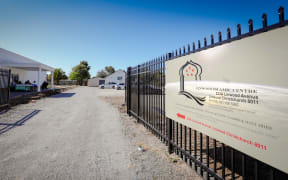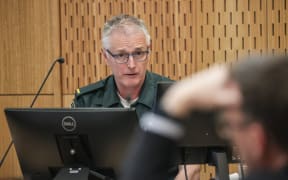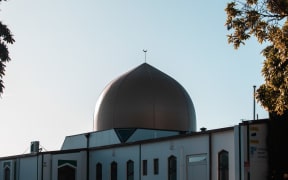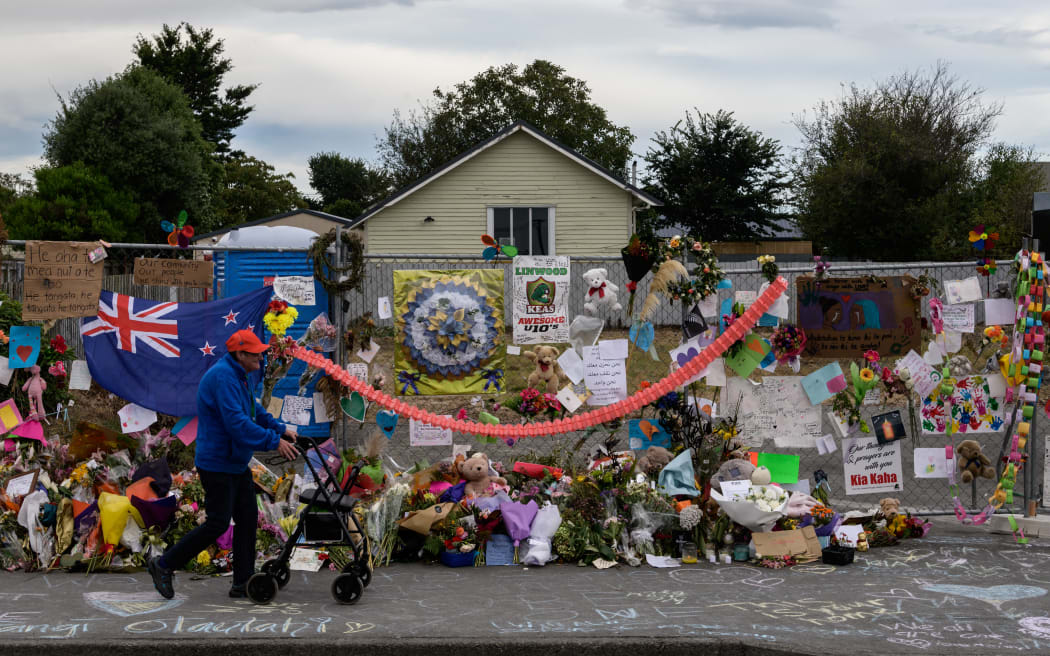
Tributes and flowers for the victims of the 15 March 2019 terror attack at Linwood Islamic Centre in Christchurch (file image). Photo: AFP / ANTHONY WALLACE
Highly-trained paramedics spent more than six minutes parked on the side of the road and needed to be convinced to proceed to Linwood Islamic Centre after the Christchurch terror attack, an Australian police officer says.
The inquest into 51 people murdered during the March 2019 shootings on Monday morning heard from two police officers who travelled to the mosque with specialist St John staff on 15 March.
The two police officers - one from Auckland and the other from Australia - were in Christchurch at the time of the attack for a sniper training course.
Seven people were killed at Linwood Islamic Centre, the terrorist's second target after he massacred worshippers at Al Noor Mosque seven kilometres away.
The Australian officer told the Coroners Court he recalled much of the six minutes the paramedics spent on the side of the road was filled by officers convincing them to continue to the mosque.
"I would say that we were there as protection, and I think people being actively killed outweighed the need to remain out of the scene," he said.
One of the two SERT paramedics has denied they needed persuading to continue on to the scene.
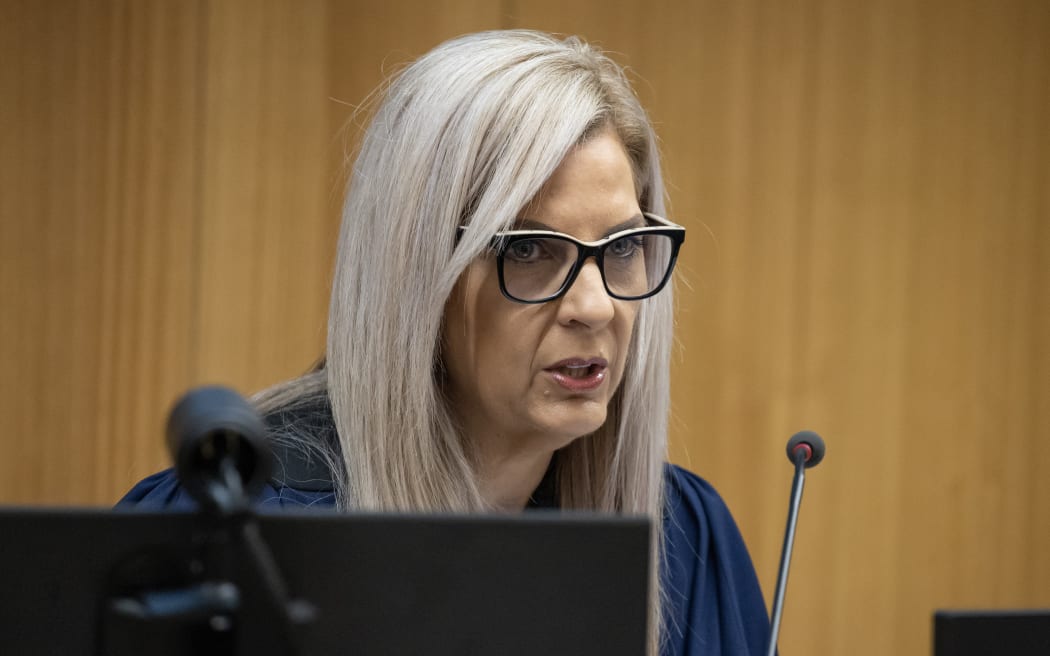
Deputy chief Coroner Brigitte Windley. Photo: Pool / Iain McGregor / The Press
The officer confirmed to deputy chief coroner Brigitte Windley he believed being in that vehicle held him back from getting to the scene.
The paramedics were waiting to hear if the scene was safe and if they had permission to continue driving there, he officer said.
The Auckland-based officer, a member of the Armed Offenders Squad (AOS), said the pair were sent to Christchurch Central Police Station when they heard news of the attack. There they jumped in a St John Specialised Emergency Response Team (SERT) vehicle alongside the specialist paramedics.
He told the court he did not know exactly where they were going when he got into the vehicle. It became clear while driving that Linwood was the "newest" scene and the most important to get to.
The SERT paramedics then pulled the vehicle over to put on protective equipment and sort out where they were going.
The AOS member also spoke to a member of the public who wanted to go to the mosque. He told them to go inside and stay put.
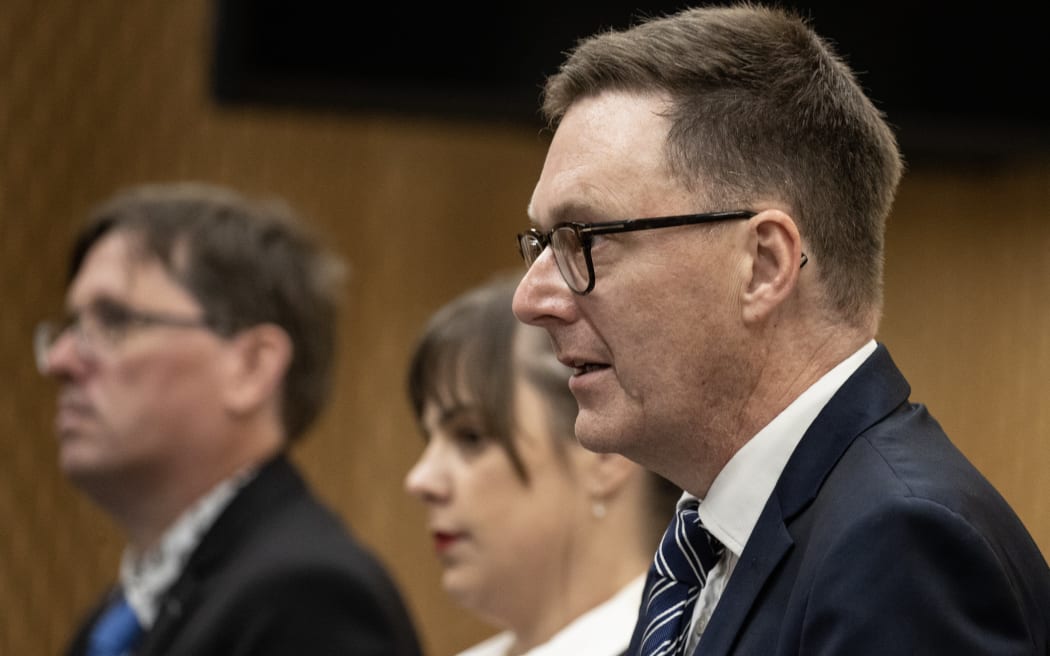
Counsel assisting the coroner David Boldt. Photo: Pool / Iain McGregor / The Press
David Boldt, a counsel assisting the coroner, told the court the stop lasted about six-and-a-half minutes.
The AOS member said he did not know what made the St John staff decide to continue driving to the mosque, but he believed it might have been because he told them to.
He was focused on getting to the scene to help and wanted to get there as soon as possible.
He told the court the decision for SERT to pull over and "kit up" was necessary and understandable.
"Him stopping, as far as I'm concerned, is a necessary and sensible course of action. The reason for that is obviously getting some sort of situational awareness over the incident, suiting up and obviously having to talk to the member of the public on the side of the road.
"I wouldn't say I was unhappy with the stop. What I would say is I'm eager to get to the scene to do my job."
He did not believe the mosque was safe when he arrived about 2.21pm, the officer said. He was unaware it had been cleared.
The AOS member and Australian officer left the SERT members in the vehicle further up the road and ran towards the mosque to begin clearing the scene.
He confirmed he had missed a radio transmission at 2.12pm, which said the scene was under control. Had he known it was safe, "we would have brought SERT forward with us" to help the injured victims, the officer said.
First responders did their best following 'evil attack'
Critical care paramedic Dale Muller said police, St John and medical staff from a nearby clinic worked hard to help victims of the "evil attack".
Muller was one of the two St John SERT paramedics to go to the Linwood Avenue mosque.
It was fortunate police were willing to transport patients to hospital, and medical staff from a nearby centre came to the mosque to assist in the absence of available ambulances, he said.
The inquest earlier heard that ambulance resources were busy responding to the Al Noor Mosque scene.
"If we did not have that assistance, or we were in a more remote area without ready access to a major hospital, we would have needed more ambulances so there were enough crew to care for patients and transport them," Muller said.
"I believe that police, St John and the staff at the medical centre all worked hard to achieve the best we could for the victims of this evil attack."
Muller told the court that he was the one to suggest the SERT vehicle pull over while en route to the mosque.
"I cannot recall what was said but no-one disagreed."
He disagreed that he and his colleague had to be persuaded to continue driving to the scene.
Muller said he wanted to make sure they were going to the scene where they would be most utilised.
Once of the police officers said they should continue driving to Linwood Avenue, he said he was "happy to move".
Unlike usual situations that SERT responds to, Muller said he was never given a briefing prior to heading to the scene.
It meant he was unaware of the status of the scene, how many attackers there were and where they were, and what medical response was required.
"I am not critical of police for not providing a briefing at the station and for us being without situational awareness.
"This series of attacks was extraordinary. Police, and we, were doing what we could."
On arrival at the scene, Muller said he did not believe it was safe enough for general ambulances to attend as it appeared the scene was still being cleared.
About five minutes later, Muller said he got on the radio and called for ambulances to come forward as he felt more comfortable with the safety of the scene.
The inquest will examine the following 10 issues over six weeks:
- events of 15 March 2019 from the commencement of the attack until the terrorist's formal interview by police
- response times and entry processes of police and ambulance officers at each mosque
- triage and medical response at each mosque
- the steps that were taken to apprehend the offender
- the role of, and processes undertaken by, Christchurch Hospital in responding to the attack
- coordination between emergency services and first responders
- whether the terrorist had any direct assistance from any other person on 15 March 2019
- if raised by immediate family, and to the extent it can be ascertained, the final movements and time of death for each of the deceased
- the cause of death for each of the victims and whether any deaths could have been avoided
- whether Al Noor Mosque emergency exit door in the southeast corner of the main prayer room failed to function during the attack and, if so, why?
The inquest continues.

